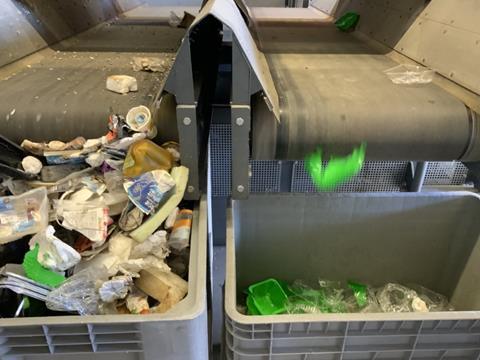
A sorting test carried out by TotalEnergies Corbion and TOMRA Recycling claims to have proven the feasibility of sorting PLA from other plastics in municipal mixed plastic waste streams.
A Near Infra-Red (NIR) sorting machine is said to have been used to recover high-purity PLA trays from other post-consumer plastics at the TOMRA centre in Mülheim-Kärlich, Germany. Reportedly, no PLA trays ended up in the PET stream during the sorting of the PET bottle fraction – an indicator that PLA will not contaminate other recycling streams, according to the companies.
As such, TotalEnergies Corbion is aiming to collect used PLA products from closed-loop systems and pre-consumer waste, using it as feedstock to create rPLA and reduce both landfill waste and incineration. Doing so is expected to lower carbon emissions and reduce the need for biomass and land use.
“Plastic waste collectors and sorters know that using the infrared technology, PLA plastic products can easily be sorted from other municipal waste,” says Jürgen Priesters, SVP TOMRA Feedstock. “In closed loop environments, where PLA bottles and PLA cups are exclusively used, the amount of PLA is sufficiently high to also make it economically feasible to collect, sort and clean the PLA.”
“In collaboration with Tomra, a leading supplier of waste sorting equipment, we confirmed (again!) that PLA can be effectively sorted from other municipal plastic waste using existing separation equipment,” adds François de Bie, Senior Marketing and Supply Chain Director at TotalEnergies Corbion. “Claims that PLA contaminates PET recycle streams have again proven to be nonsense. Many other studies, as cited in our white paper about end of life options for PLA, have confirmed exactly the same.
“In short, no technical barrier exists that prevents an effective separation of PLA from other plastic waste.”
The results are promising in light of the partnership between LG Chem and ADM, which hopes to result in enough pure lactic acid to produce PLA on a commercial scale. Danimer Scientific, Inc. also signed an agreement with TotalEnergies Corbion for the supply of its Luminy PLA portfolio.
In other news, CEFLEX recently conducted a testing programme for NIR technology in the sorting of multi-layer flexible packaging structures, aiming to update the Designing for a Circular Economy guidelines first issued in 2020.














No comments yet